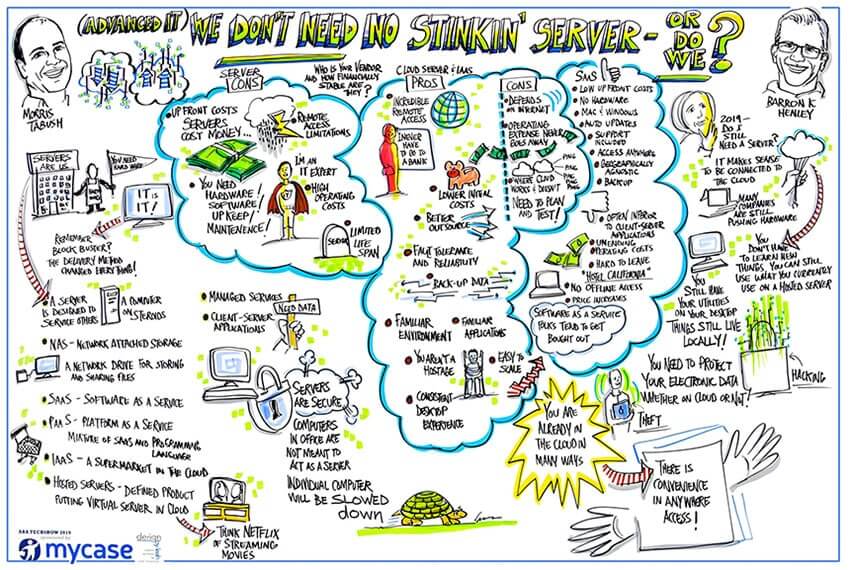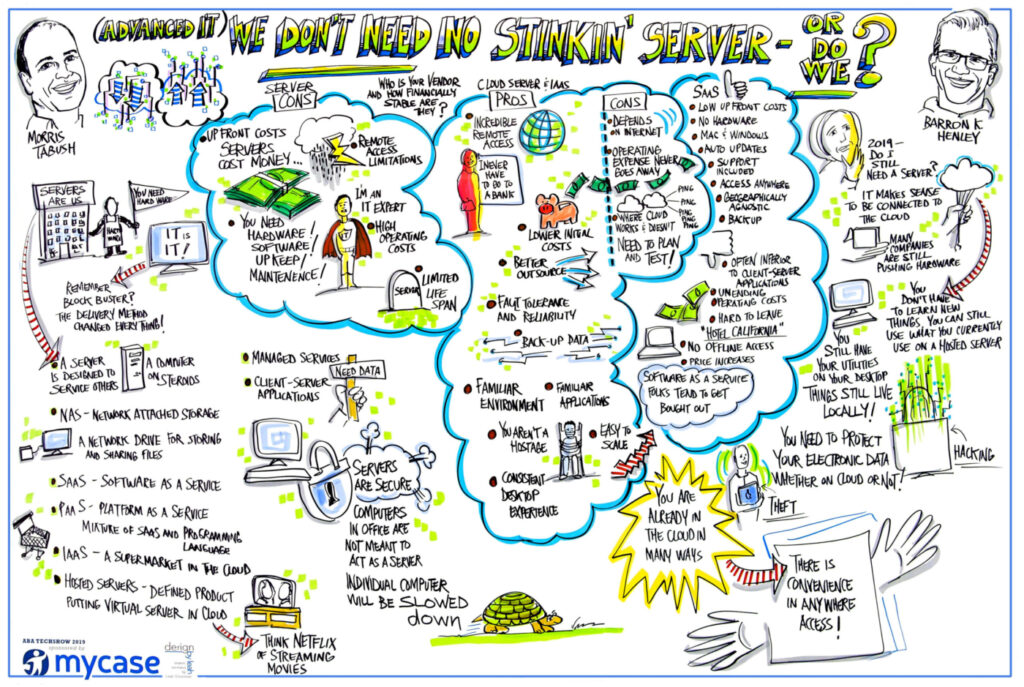Cloud Services for Law Firms – the Pros & Cons
Summary of results of the latest ABA Legal Technology Survey Report.
Apr 24, 2019
| 0 min read
Cloud services for law firms is not a fad or trend. Compared to year’s past, cloud computing is now a concept that’s familiar to most lawyers. And with that increased familiarity comes trust. For evidence of this you need look no further than the results of the latest ABA Legal Technology Survey Report.
Bogged down by your server-based law practice management software?
According to the Report, a full 31% of lawyers surveyed advised that the primary reason that their firms made the move from premise-based software to cloud-based software in 2018 was because it provided better security than they were able to provide in-office. Because lawyers are increasingly trusting cloud computing software, it should be no surprise that the results of the Report also showed that the majority of lawyers (55%) are now using cloud computing software tools for law-related tasks.
If your firm isn’t yet on board, but you’re interested in learning more about cloud services for law firms, then you’ve come to the right place! This very topic was covered last month at the ABA Techshow in Chicago. During this presentation – “We Don’t Need no Stinkin’ Server – Or Do We?” – Morris Tabush and Barron Henley discussed the pros and cons of premise-based computing and cloud computing software use by law firms.
Below you’ll find the visual notes from that session along with some of our favorite tips (click to view larger image):
Server Pros and Cons
According to the presenters, there are a lot of downsides to storing your firm’s data on a server located in your law firm. The most notable drawback? Cost. Servers cost a lot of money to purchase and to maintain. And on top of all that, guess what? You’ll need to retain the services of an IT pro to install and maintain your firm’s servers, which is yet another added expense. And your firm’s servers have a limited life span. Eventually you’ll need to buy new ones, and incur additional expenses. And last, but not least, your remote access options are limited – and sometimes don’t work very well – so viewing law firm data located on your firm’s servers when you’re offsite can be difficult, at best.
Of course, premise-based servers do have some benefits. If maintained properly and your staff is adequately trained regarding cybersecurity risks and practices, your firm’s servers can be secure. And, using servers to house firm data, as opposed to your computers’ hard drives, is a more efficient and practical way to store and manage your firm’s case-related information. That being said, in 2019, law firms have far better options than law firm servers – namely, storing data in the cloud.
Cloud Computing Pros and Cons
According to the presenters, the many benefits of cloud computing far outweighed the drawbacks. For starters, cloud computing is more cost-effective, in part because the initial costs of moving to the cloud are far lower than purchasing a server. Cloud computing also provides offsite backup storage, which offers any number of benefits, not the least of which is a built-in disaster plan for your firm’s data.
Another benefit: remote access is a breeze with cloud computing, since all data stored in the cloud is accessible using any internet-enabled device. The remote access features also make it much easier when it comes to outsourcing your firm’s work, since you’re able to grant the person you’re working with access to only specific documents or files, as opposed to your entire firm’s system (which is your only option when all data is stored on servers located in your office).
And last, but not least, cloud-based computing is also easy to scale. So as your firm grows, it’s a simple matter of buying more cloud storage space and/or new user subscriptions to your cloud-based legal software.
Of course cloud computing does have some drawbacks. The first is that Internet access is required in order to access your information stored in the cloud. But you can always use your phone’s data plan or a mifi device as a backup should the internet go down. Another con is that monthly or annual subscription prices are typically charged, however those tend to be far more affordable than the upfront expense of servers and the IT costs associated with installing and maintaining servers over time.
Cloud Software Pros and Cons
The presenters also addressed the pros and cons of cloud-based software (also referred to as SaaS). They emphasized the low upfront costs and the lack of hardware as some of the primary benefits. Another benefit discussed was that cloud-based software can run on all operating systems so you’ll be up and running in no time regardless of whether you use use a Mac or PC. This is a huge advantage of cloud based services for law firms.
Another benefit is that the software updates automatically, and many companies roll out updates quite frequently. This is a great benefit since you don’t have to wait months for your software to be improved and new features added are added on a regular basis. They also noted that support is included with SaaS subscriptions.
Of course, because SaaS is cloud-based, you’ll need a reliable internet connection in order to ensure access. They also explained that you should be aware that you may encounter a price increase in the form of an increased subscription rate. That’s why it’s important to ask any companies that you’re considering whether they’ve recently increased their prices. If they have, chances are they won’t be increasing them again anytime soon, since price increases of that nature occur very rarely.
The presenters also noted that SaaS companies are sometimes acquired by other larger software companies. So when vetting cloud computing providers, make sure that you have a full understanding of their history. If they’ve already been acquired, then that’s one less thing to worry about.
It’s true: cloud services for law firms is not a trend, it’s the future, and the future is here. Now that you’ve learned about the pros and cons of servers and cloud computing, are you ready to make the switch? If so then make sure to download this free guide to get your firm on its way: “Moving Your Law Practice to the Cloud: How to Transition to Cloud-based Legal Software.”



